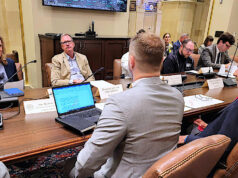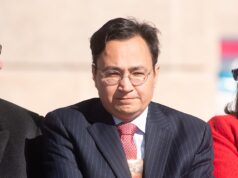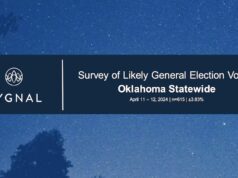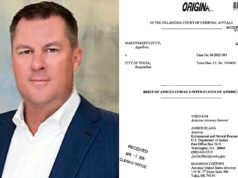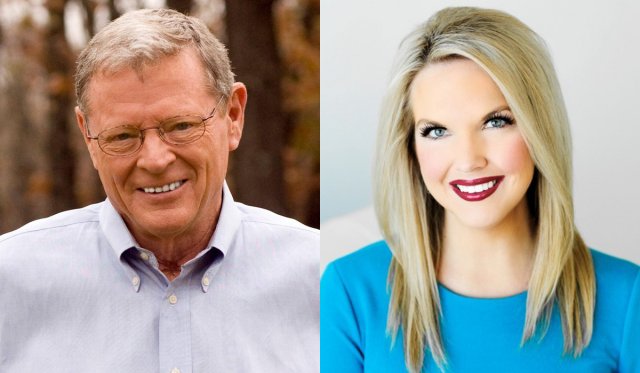

At 85 years old, incumbent Sen. Jim Inhofe is seeking what could be his last waltz in politics, a fresh six-year term in the U.S. Senate that would let him craft policy for the federal government through his 91st birthday.
He made the decision to run for his fifth six-year term in January. The moment of clarity came after taking stock of the political landscape. He wants President Donald Trump to stay in the White House and the Senate to stay in the hands of Republicans.
“I’m older now than I was,” Inhofe said when asked what’s different this time about his decision to run for re-election.
He then pivoted to the Democratic Party.
“The Democratic Party is different than it has been in the past,” he said. “They’ve always been leaning toward socialism, but not as overtly as they are now. Democrats and Republicans have different philosophies. I understand that. But never to this extreme. So we were looking at it and thinking, ‘We really need to make sure these guys don’t get control.'”
Standing in his way is Abby Broyles. The 30-year-old lawyer and former KFOR television journalist is the first woman that Inhofe has ever faced as his principal general election opponent.
Broyles is a heavy underdog, with a News 9 poll earlier this month showing her trailing Inhofe 57-33.
But you’d never know it. Broyles spent the summer traveling across the state as much as safely possible, holding online events with supporters and pounding away at Inhofe, who she believes is an empty vessel for Trump, is out of touch and is wrong for Oklahoma.
“I don’t think Sen. Inhofe has ever run against an opponent like me,” she said. “I’ve called him out because of the questionable decisions he’s made. The lack of leadership during the pandemic. We can do better.”
A contrast of visions
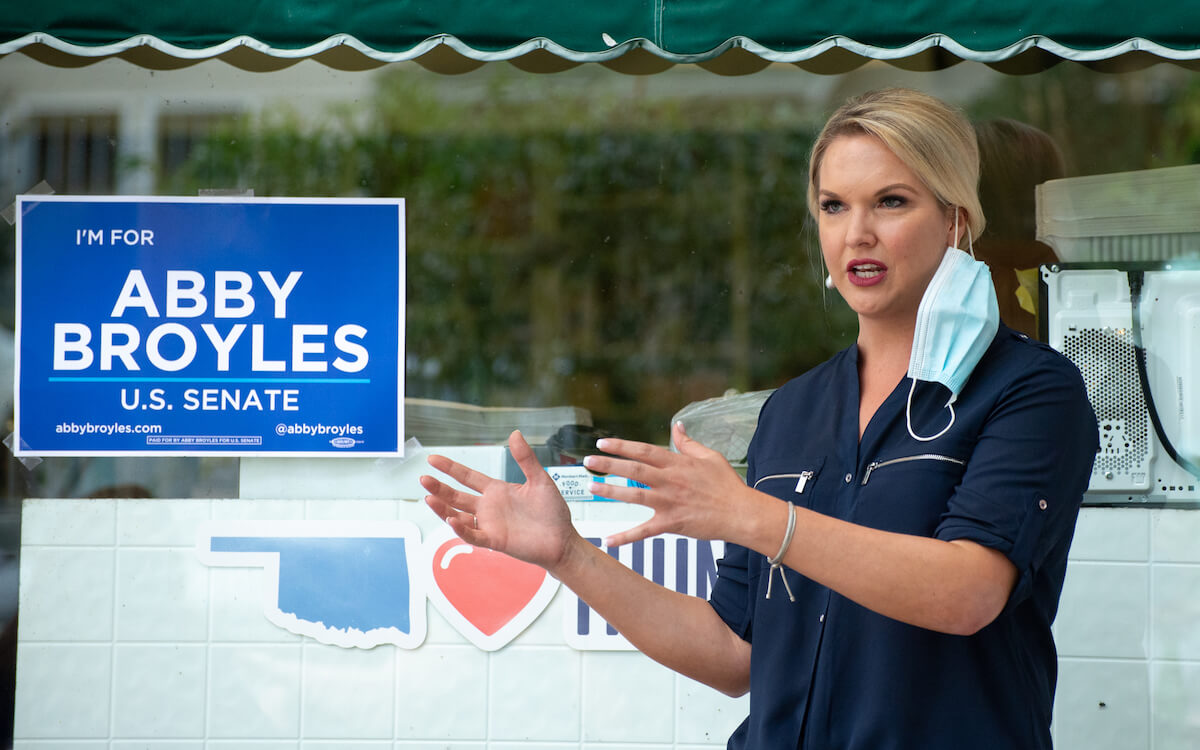
Broyles’ first-ever foray into politics is in the deep end of the pool. While many first timers start at the city council level or in the state Legislature, Broyles decided to go big.
She launched her campaign late last year to limited fanfare, but she has gradually found an audience. Her Facebook page has 16,000 likes, and 46,000 people follow her on Twitter. This month she began running her first TV ads.
In her travels across Oklahoma and in the world of Zoom town halls, Broyles said her biggest takeaway is that Oklahomans are ready for something different in Washington.
“I see so many people who are hungry for change and new leadership,” she said. “Medicaid expansion passed in June. People are concerned about putting food on the table and having health care. I find that all over the state. These are extraordinary times.”
She’s not shy about taking the fight to Inhofe directly. She crashed a TV ad shoot in Tulsa last month, hoping to urge him to debate her. Inhofe wasn’t at the shoot, according to a campaign spokesman, but the effort drew local media coverage.
“He’s no longer up for the job,” Broyles told the Tulsa World. “It’s very clear. He was on live TV earlier this week rambling on and on about Portland, Oregon, and I care about going to work for Perry and Purcell and Pauls Valley — towns in Oklahoma. He is completely out of touch with the people he represents, and I can do a better job.”
Broyles is up against a lot in the race, not the least of which is Inhofe’s financial advantage. In his most recent filing his campaign reported having $2.2 million in cash on hand as of early August. Broyles’ last report came in June when her campaign reported $186,631 cash on hand, but she has raised more than $725,000 total.
Even if outside groups like the Democratic Senate Campaign Committee got involved, Broyles will still likely be at a money disadvantage. It’s not something she likes, but she said she understands it’s part of the territory for a Democratic newcomer in a blood-red state.
“I think what it’s really about it is connecting with voters and meeting them on pocket-book issues like health care and sending their kids back to school,” she said. “We don’t have leaders who are connected with reality. And that connection can come through digital and electronic media outreach and, hopefully, in-person contact whenever possible.”
‘Keeping wolves far from Oklahoma’s border’
Inhofe’s latest TV ad features a folksy narrator listing his character attributes before shifting to a darker tone. The dangers of liberals, progressives and socialists are also extolled.
The ad closes with an ominous message: “Serving us is Jim’s life. Keeping wolves far from Oklahoma’s borders.”
Though Broyles isn’t mentioned by name, it’s implied she and other progressive Democrats like her are a danger to Oklahoma.
“I don’t know much about her other than being pretty extreme,” Inhofe said. “It’s something she wants very badly. What her motive is, I don’t know. I don’t care. It’s just that hers is not a philosophy that is really consistent with me or the people of Oklahoma, judging from past elections.”
Broyles’ most recent TV ad fires back, panning Inhofe for being in elected office for 53 years and missing votes in the Senate.
“He just can’t do it anymore,” says an upbeat narrator. “It’s obvious to everyone but him that he’s just not up for the job.”
‘I was in shock’
On Oklahoma matters, Inhofe has been monitoring the fallout from the McGirt v. Oklahoma decision handed down by the Supreme Court in July. The landmark ruling functionally designated much of eastern Oklahoma as Indian reservations.
“I was in shock when that decision came,” Inhofe said. “I was one of the people sitting around saying, ‘Don’t worry about it. It’s not going to happen.’ And it did.”
He said for resultant issues to be resolved, it’s going to take a partnership.
“We were talking about what is the role for us,” Inhofe said of his office. “I don’t want to be involved in anything unless we have the tribes involved with it. The first thing I did was talk to the chiefs of the tribes. I talked to all five all of them. I said that this is something that we all need to work out together.”
A loyal ally to Trump
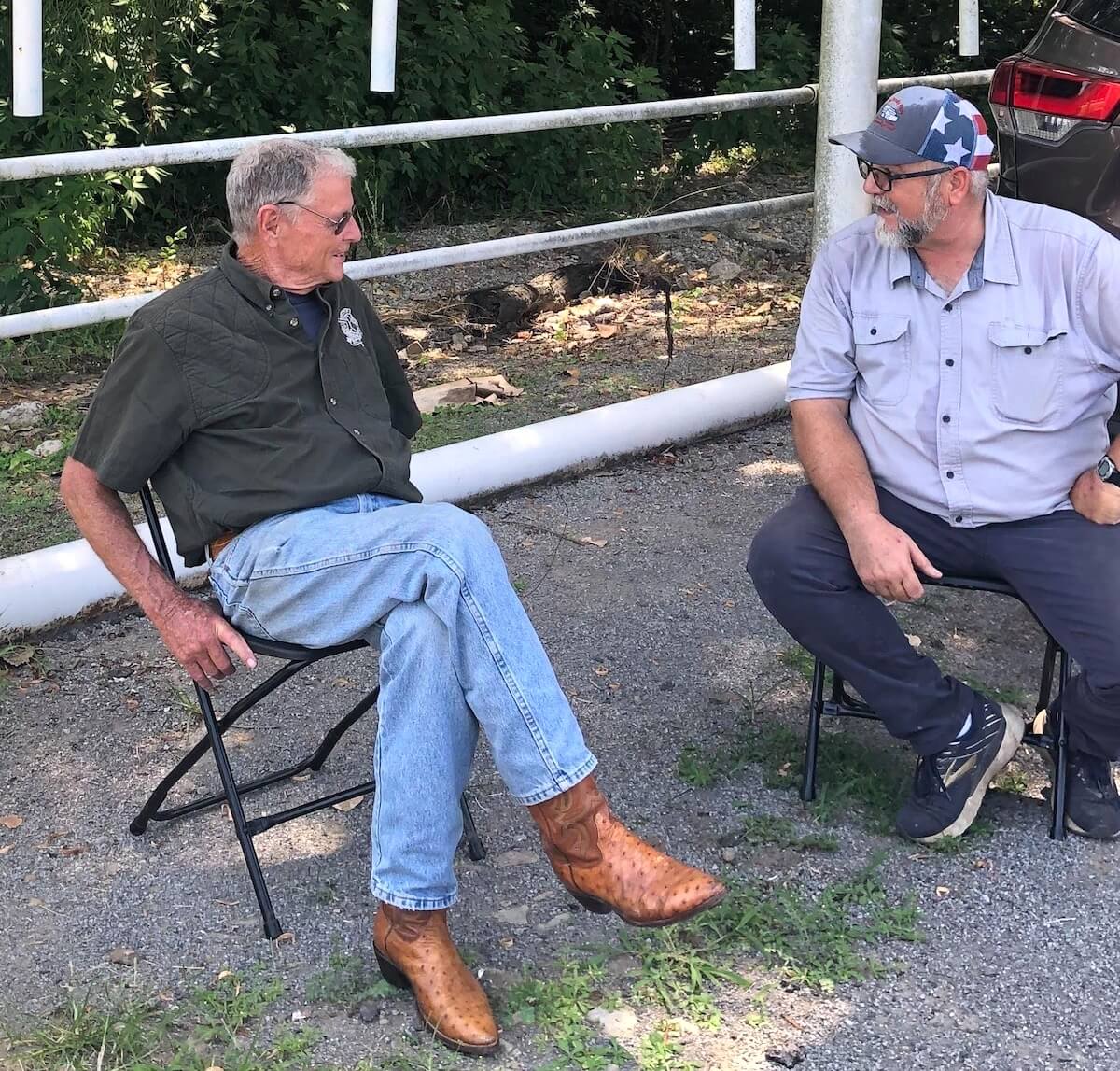
Inhofe has a plan for every weekend, and it’s relatively simple.
“I do something that I know Chuck Schumer isn’t doing,” he said.
On a recent weekend, he and his 16-year-old grandson were splitting wood when Trump called. They spoke for a few minutes before Trump asked to speak to the teen.
“He talked to him for 15 minutes,” Inhofe said. “We timed it. How many presidents would do that?”
While some Republicans up for re-election might slightly shy away from Trump’s image, Inhofe embraces him both politically and personally. While Trump’s novel conronavirus response has imperiled his re-election bid, Inhofe remains steadfast in his support, downplaying revelations about how Trump really views the pandemic in Bob Woodward’s most recent book.
“I really can’t see anything there at all because I know when he first got started on this thing, he talked about how serious it was,” he said. “Nobody really knew it. His first action was to stop China travel. I think he’s done a good job.”
Inhofe also doesn’t believe allegations that Trump disparaged American military personnel as reported by The Atlantic and other news outlets earlier this month.
“I’m with this guy all the time,” he said. “The president has a real, heavy and sincere relationship with the military. I’ve seen him interact with our service men and women.”
On the contrary, Inhofe’s highest praise for Trump centers around his belief that he’s been good for the military.
“Between 2010 and 2015, President Obama cut the military by 25 percent, and at the same time China increased theirs by 83 percent,” Inhofe said. “[Trump has] done a good job of rebuilding our military. It’s not quite done yet, but there has been progress.”
If elected to another term, Inhofe plans to continue to work toward that goal.
“I want to continue to work on the Senate Armed Services Committee,” he said. “Defending America shouldn’t be a partisan issue, but it is. Democrats have other priorities than that.”
He also cites his close ties to Trump as a way to deliver for the state. A new veteran’s center coming to Tulsa is one example.
“I have an unusual relationship with Trump, and without it the Tulsa center wouldn’t be in Trump’s budget,” he said.
Broyles makes health care, education priorities
While Inhofe’s campaign has focused on his ability to help the state’s oil and gas industry through difficult times — and the value of his seniority in protecting Oklahoma’s military bases — Broyles has taken on other issues that she believes directly impact voters.
Health care, climate change and closing the gender pay gap are among her top priorities for Broyles who recently earned the backing of Oklahoma native and Massachusetts Democratic Sen. Elizabeth Warren.
“Health care is definitely my biggest priority,” Broyles said. “Especially during a public health crisis where so many people have lost their jobs. I want to protect Oklahomans with pre-existing conditions. The bottom line is we have to make health care more accessible for everyone.”
She also sees federal improvements for education, especially when it comes to leveling the playing field.
“While education is a state issue, the federal government plays an important role,” she said. “There are so many kids who don’t have access to a tablet or laptops that are needed for distance learning. There’s a lack of broadband access in pockets of OKC and Tulsa, but also rural areas. There’s a lot that can be done to improve life for students and teachers from the federal level.”
The debate debate
For much of 2020, Broyles has repeatedly challenged Inhofe to a series of debates without much success.
Inhofe has rebuffed attempts to have one. Most recently, a Tulsa TV station proposed the idea of a showdown between the two candidates, but it’s unclear if the effort will pay off. NonDoc has also pitched a public debate.
Either way, Broyles believes strongly that voters should be able to see the candidates square off on policy and the direction they want to take the country.
“We should have a series of debates,” Broyles said. “Oklahomans deserve answers for why Inhofe wants another six years in Washington. Why hasn’t he been able to get health care costs under control? What is he doing for average Oklahomans? These are questions he needs to answer.”
Inhofe, who has not debated an election opponent since then-State Sen. Andrew Rice in 2008, believes by now everyone knows where he stands
“I don’t see any useful purpose so the answer is, ‘No,'” Inhofe said about debating Broyles. “There’s not one person in Oklahoma that I can find that doesn’t know where I stand on every single issue. And so I just don’t see any reason.”
Broyles has no plans to relent.
“I’m going to press him on it until the end,” she said.
Third-party candidates
Joining Inhofe and Broyles on the ballot are Libertarian Robert Murphy and independents Joan Farr and A.D. Nesbit.
Murphy announced his campaign in April.
“I think it’s vital that the people of Oklahoma have an alternative to the prevalent statist notion, held by too many of our elites, that only an increased amount of government power and control can solve all of our problems,” Murphy wrote in a Facebook post.
Farr is a lawyer who plans to take a poll of Oklahoma voters on any bill in Congress before she votes on it to ensure she is reflecting the views of a majority of Oklahomans.
Nesbit is a teacher who said as an independent she is not beholden to any party. Her priorities include children’s advocacy, education and financial security.










